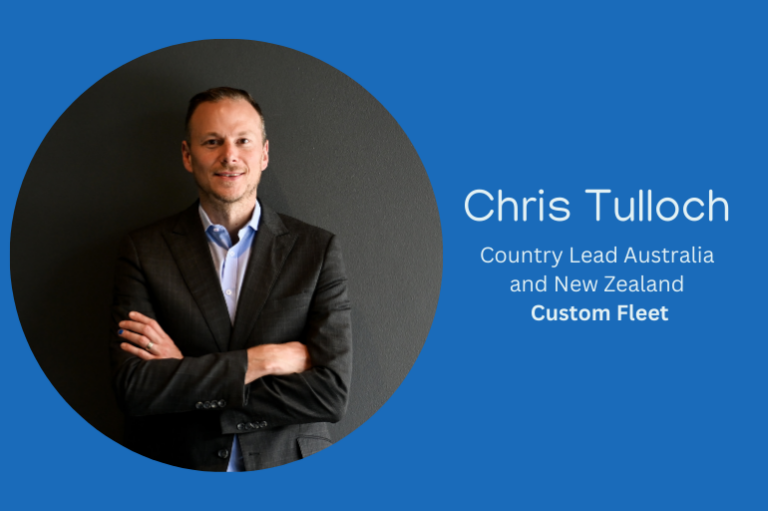Custom Fleet is part of Element, a global leader in fleet management, and I had the chance to talk with Chris Tulloch, Country Lead Australia and New Zealand at Custom Fleet, about sustainability, the fleet management marketplace, and the current state of the supply chain.
Marc: Chris, what’s your view on the fleet management industry and the current market players?
Chris : It’s still a very crowded marketplace. Traditional FMOs are continuing with their roles, particularly in transactional scale processing and financing elements. However, the legacy systems make it hard to adapt to the new world with EVs.
A new breed of competitors provide specialist knowledge for specific customer segments like electric vehicles. This shift is creating a more dynamic marketplace with new competitors and opportunities.
Marc: How do you see Custom Fleet fitting into this dynamic marketplace?
Chris: We’re exploring various segments and thinking about future competition.
The future is about helping our customers decarbonise their fleets and make the most of their EVs and infrastructure investments.
The market is becoming more dynamic with new and different competitors, which creates numerous opportunities.
Marc: With so much day-to-day focus, how do you manage to have strategic conversations with fleet managers?
Chris: You’re right; it’s challenging. Fleet managers are often focused on fulfilment. However, electrification has changed the conversation. Now, there’s a clear path to engage with executives who care about sustainability. This shift allows us to have more strategic discussions beyond just fleet management.
Marc: Let’s talk about your sustainability report. What prompted its creation?
Chris: We launched a global sustainability report focusing on people, planet, customers, and communities. Our priority is emission reduction, setting science-based targets, and ensuring our actions align with rigorous standards for sustainable growth. In 2023, we reduced our Scope 1 and 2 emissions by 44% globally. In Australia and New Zealand, 100% of our internal fleet has transitioned to EVs, and we’ve doubled the number of EV chargers installed with customers.
Marc: What challenges have you faced in transitioning your fleet to EVs?
Chris: We’ve encountered several challenges. We used multiple vehicles from various manufacturers to gain insights and provide better direction to customers. Installing chargers in all our offices and employees’ homes was crucial to understanding the nuances of EV adoption. Government incentives have been essential in offsetting costs for customers, especially for home charging solutions.
Whilst there is still a lack of fit for purpose EVs in certain popular vehicle segments and investment in charging infrastructure (public and private) needs to accelerate.
Marc: How do government policies impact the adoption of EVs?
Chris: Government policies are crucial. In New Zealand, the fee rebate scheme significantly boosted sustainable solutions before it was removed, leading to a decline in EV uptake. In Australia, the Fringe Benefits Tax (FBT) waiver for EVs has driven a 40% increase in enquiry rates in our novated business. This policy has helped re-educate the market on the benefits of novated leasing, making it an attractive option for financing vehicles.
Marc: How do global perspectives compare to the advancements in New Zealand?
Globally, the leaders in EV adoption have been European countries like Norway, Sweden, Denmark and The Netherlands and China. New Zealand’s EV trajectory was following many of the leaders until the recent change in government policy which has resulted in a slowdown. Conversely, government policy has turbo charged EV adoption in Australia. This highlights the importance of policy and incentives at this early point in the EV growth story.
Marc: Which industries are leading the charge in sustainability and electrification?
Chris: Government sectors and large corporates are at the forefront. Outside government, we focus on helping customers understand which vehicles in their fleets are ripe for electrification. This involves strategic advisory services to assess vehicle usage patterns and determine the best candidates for transition.
Marc: What are your thoughts on the future of fleet management in terms of supply chain dynamics and vehicle pricing?
Chris: The post-COVID recovery has seen strong new vehicle sales, but models like the RAV4 Hybrid remain in high demand and short supply, maintaining buoyancy in the secondary market. For commercial vehicles, while new vehicle supply has improved, the bodybuilding process remains slower than pre-COVID levels, causing delays in deployment. Despite these challenges, our order pipeline remains strong, indicative of ongoing demand and company growth.
Marc: What about heavy vehicles and the future of sustainability in that sector?
Chris: There’s an appetite for more sustainable solutions in every asset class, but heavy commercial vehicles are the furthest from having viable options. Hydrogen might be a future alternative, but questions remain about its transportation and refuelling infrastructure. We continue to explore options and are optimistic about new technologies coming to market.
Marc: Any final thoughts on the industry’s future and Custom Fleet’s role?
Chris: Sustainability and electrification are pivotal for the future of fleet management. Custom Fleet is at the forefront, leveraging strategic insights and practical experience to help customers navigate EV adoption and sustainable practices. The evolving marketplace, driven by technological advancements and supportive government policies, presents challenges and opportunities that will shape the industry’s future. We’re committed to driving sustainable growth and leading by example in this transition.






